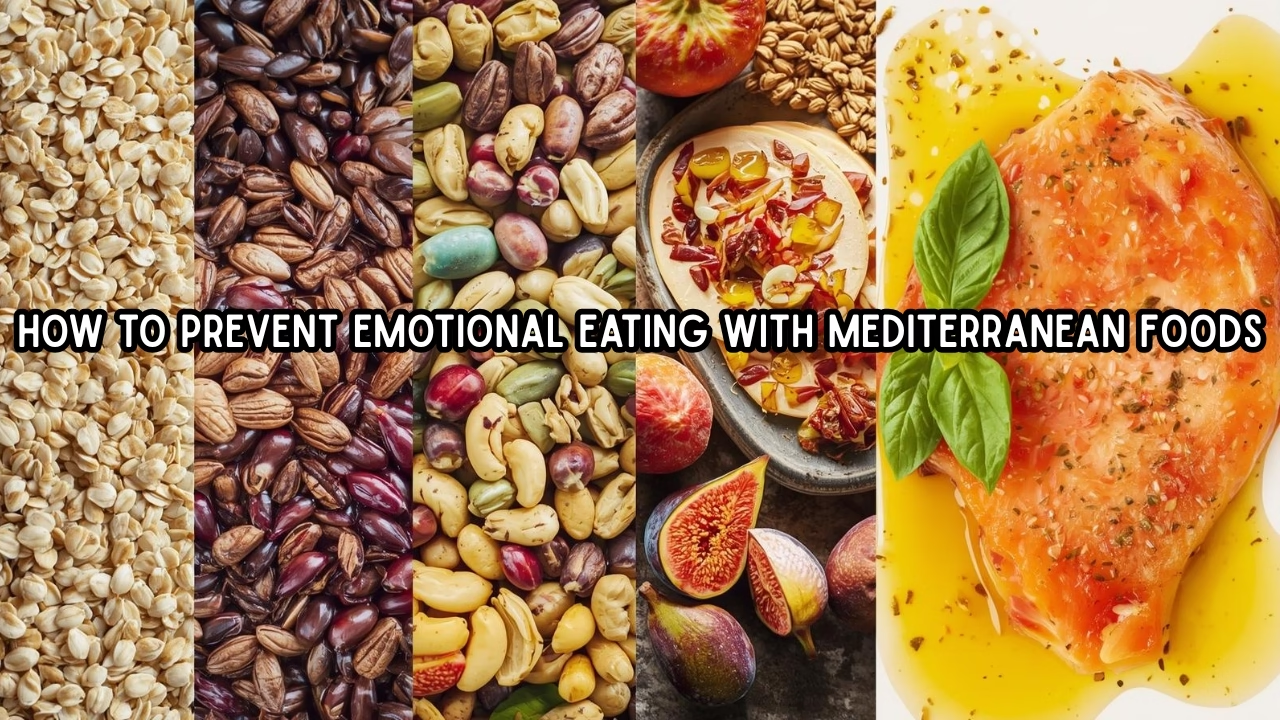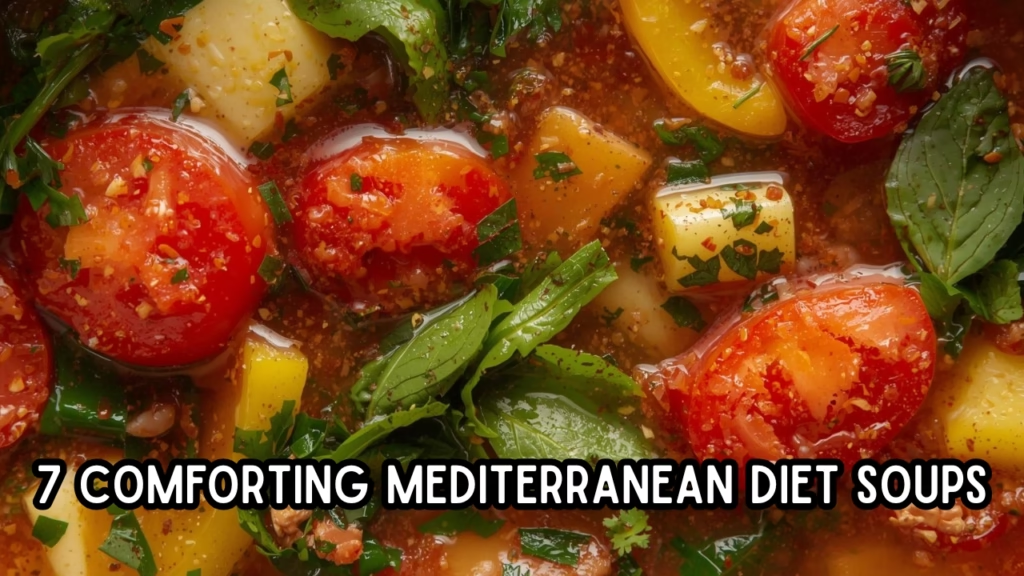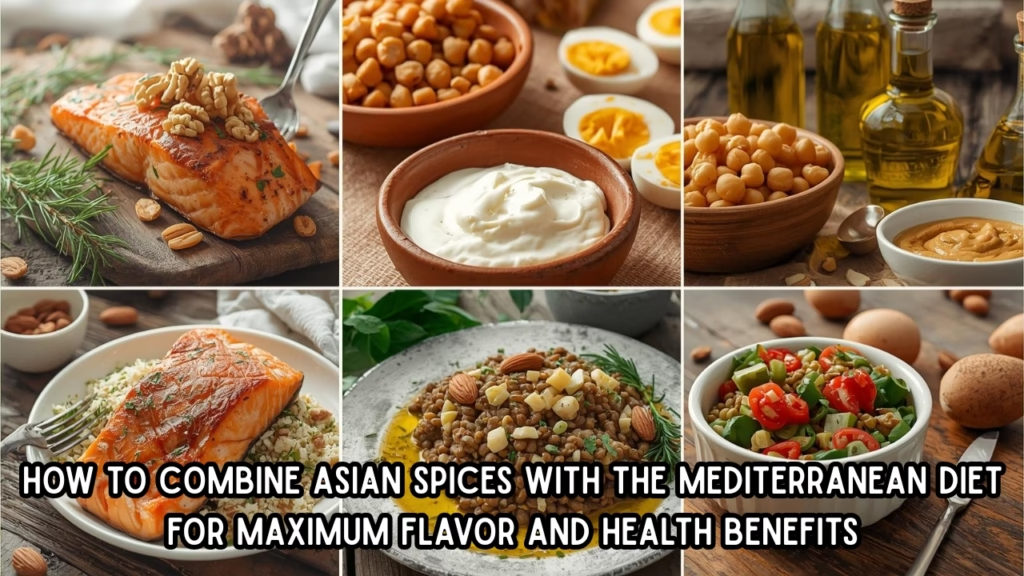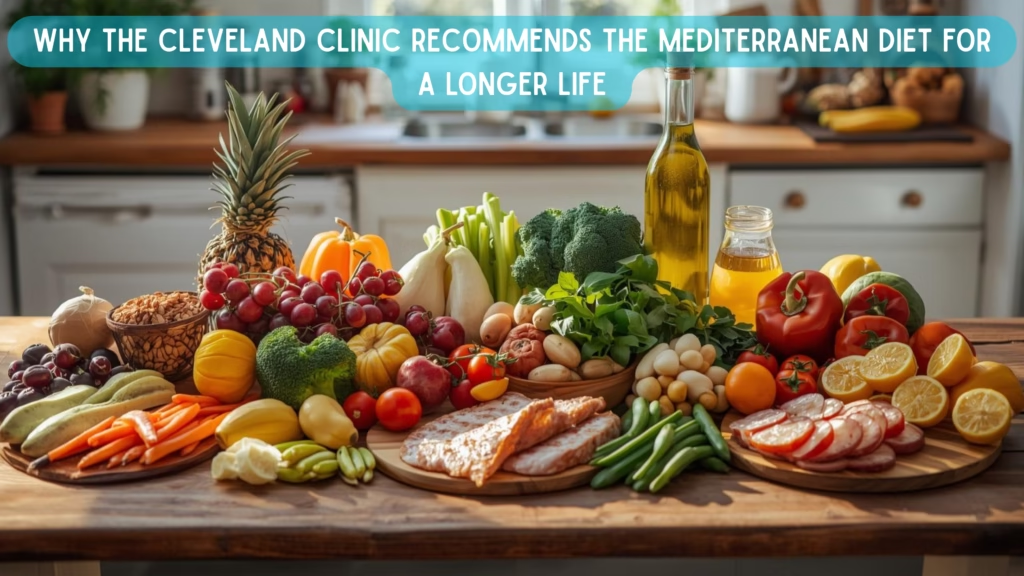How to Prevent Emotional Eating with Mediterranean Foods

How to prevent emotional eating with Mediterranean foods is a question more people are asking today, especially in a world where stress, fatigue, and fast-paced living often push us toward comfort foods that may satisfy us in the moment but leave us feeling worse later. If you’ve ever found yourself opening a bag of chips late at night or finishing half a tub of ice cream after a tough day, you’re not alone. Emotional eating is deeply human—it’s one of the ways our bodies and minds seek comfort, familiarity, and quick relief.
But here’s the good news: food doesn’t always have to work against you. In fact, when chosen wisely, it can work with your emotions. That’s where learning how to prevent emotional eating with Mediterranean foods becomes a powerful shift. The Mediterranean Diet, long celebrated for its heart-protective and anti-inflammatory benefits, also provides a steady foundation for emotional resilience. It’s not just about physical health—it’s about balance, joy, and mindful nourishment. As Harvard Health notes, the Mediterranean Diet is more than just a meal plan—it’s a lifestyle that integrates food, social connection, and mindful living into daily life.
In this guide, you’ll learn how to prevent emotional eating with Mediterranean foods by understanding why it happens, how the Mediterranean Diet supports emotional balance, and the lifestyle habits that make this approach sustainable for life.
Why Emotional Eating Happens
Before diving into Mediterranean foods, it helps to understand why emotional eating happens in the first place. It’s rarely just about willpower—it’s about biology, psychology, and environment.
1. Stress Hormones and Cravings
When you’re under stress, your body releases cortisol, a hormone that increases appetite and cravings for high-fat, high-sugar foods. These foods provide quick energy but often lead to a crash later. This is why stress eating feels automatic. Interestingly, the Mediterranean Diet for stress and cortisol balance is increasingly studied as a natural way to stabilize these hormone-driven cravings.
2. Dopamine and Reward Loops
Sugary and processed foods activate dopamine, the brain’s “feel-good” chemical. While this feels rewarding in the short term, it can trap you in a cycle where your brain craves more of these quick hits of pleasure. That’s why knowing how to prevent emotional eating with Mediterranean foods is so effective—it replaces those fast, empty rewards with steady nourishment that truly satisfies.
3. Emotional Triggers
Loneliness, sadness, boredom, or even happiness can trigger eating as a coping mechanism. Food becomes a substitute for emotional connection or stimulation.
4. Blood Sugar Swings
Refined carbs and sugary snacks cause blood sugar to spike and then crash. These crashes intensify irritability and hunger, leading to overeating. The Mediterranean Diet, with its emphasis on whole grains and steady energy sources, offers a natural solution here.
How the Mediterranean Diet Supports Emotional Balance
The Mediterranean Diet is unique because it addresses the root causes of emotional eating while being flexible, enjoyable, and deeply satisfying. It’s the foundation of learning how to prevent emotional eating with Mediterranean foods naturally.
1. Stabilizes Blood Sugar
Balanced meals with whole grains, legumes, and healthy fats keep glucose levels steady, preventing mood swings and hunger spikes. Research published in Nutrients (via PubMed) shows that diets rich in whole foods and low in refined sugars are linked to lower risks of depression and anxiety.
2. Boosts Serotonin Production
Many Mediterranean staples—whole grains, nuts, and seeds—contain tryptophan, an amino acid that supports serotonin production. Serotonin, the “happiness chemical,” helps regulate mood and reduces the intensity of emotional eating impulses.
3. Provides Healthy Fats for the Brain
Olive oil, fatty fish, and nuts supply omega-3 fatty acids that reduce inflammation and improve brain function. Studies from Mayo Clinic link omega-3s to lower depression risk and better cognitive health. Curious about olive oil? You might be interested in exploring what happens if you eat olive oil every morning for 30 days—it’s surprising how much it can impact mood and energy.
4. Encourages Mindful Eating
Unlike fast-food culture, the Mediterranean way celebrates slow meals, shared experiences, and savoring each bite. These mindful practices naturally reduce stress and help prevent mindless overeating.
Key Mediterranean Foods That Prevent Emotional Eating
If you want to know how to prevent emotional eating with Mediterranean foods, these staples make all the difference:
- Olive Oil – The cornerstone of the Mediterranean Diet, extra virgin olive oil provides monounsaturated fats that stabilize energy and reduce inflammation.
- Nuts and Seeds – Almonds, walnuts, pistachios, and sunflower seeds are rich in protein, fiber, and omega-3s. They support steady energy and improve mood regulation.
- Legumes – Chickpeas, lentils, and beans provide slow-digesting carbs that prevent blood sugar crashes.
- Whole Grains – Farro, barley, oats, and brown rice deliver sustained energy and support serotonin production.
- Fresh Fruits (Especially Figs) – Figs, often called the forgotten superfood of the Mediterranean, satisfy sweet cravings naturally.
- Fatty Fish – Salmon, sardines, and mackerel are rich in omega-3s that promote emotional balance.
- Herbs and Spices – Basil, rosemary, and oregano add flavor and antioxidants, reducing stress naturally.
Lifestyle Habits That Strengthen Emotional Resilience
The Mediterranean lifestyle goes far beyond food—it’s a way of living that strengthens emotional stability from the inside out.
- Mindful Eating: Taking time to savor food without distractions helps the body register satiety.
- Social Meals: Sharing meals with friends and family fulfills emotional needs that often trigger overeating.
- Gentle Movement: Walking, yoga, or gardening regulate cortisol and uplift mood.
- Sunlight and Sleep: Daily sunlight boosts vitamin D and improves mood regulation.
- Stress-Relief Rituals: Meditation, journaling, or spiritual reflection help address emotional roots rather than numbing them with food.
Long-Term Benefits of Preventing Emotional Eating with Mediterranean Foods
When you consistently apply how to prevent emotional eating with Mediterranean foods, you gain more than just control over cravings—you build lifelong wellness.
- Improved Heart Health: Lower risk of cardiovascular disease due to anti-inflammatory foods.
- Better Mental Health: Studies show reduced depression and anxiety rates in Mediterranean eaters.
- Stable Blood Sugar: Steady energy minimizes irritability and impulsive eating.
- Natural Weight Balance: Focus on abundance and satisfaction prevents deprivation cycles.
- Longevity and Joy: This way of eating supports both emotional and physical well-being for decades.
Key Takeaway
Emotional eating isn’t a flaw—it’s a natural response to stress and fatigue. But learning how to prevent emotional eating with Mediterranean foods gives you the tools to turn food into an ally, not an enemy. With nutrient-rich ingredients, mindful habits, and joyful meals, the Mediterranean lifestyle helps you find peace, satisfaction, and balance in every bite.
So the next time cravings strike, try this: drizzle olive oil on a fresh salad, enjoy a handful of walnuts, or savor a ripe fig. Over time, these simple choices will reshape your relationship with food and bring you closer to a calm, centered, and nourished life.
In the end, it’s not about restriction—it’s about nourishment. The Mediterranean way shows us that food can comfort, heal, and restore balance to both body and mind.
SOURCES
We carefully draw from trusted, evidence-backed sources to ensure our content’s accuracy and reliability. These references provide both practical guidance and scientific support for preventing emotional eating with Mediterranean foods shared here:
“Home Remedies: Can fish oil supplements treat depression?” — Mayo Clinic News Network article explaining how omega-3s (from fish oil) are being studied for depressive symptoms. Mayo Clinic News Network
“Fish oil – Mayo Clinic” — Background info on omega-3 fatty acids (DHA, EPA) and their roles, including what research shows so far. mayoclinic.org
You May Also Like:
How to Make Homemade Pita Bread. A Simple Step-by-Step Guide
Pita Bread Making Pita bread represents one of the oldest forms of bread still commonly…
7 Comforting Mediterranean Diet Soups Made with Simple, Healthy Ingredients
Mediterranean diet soups represent a cornerstone of one of the world’s healthiest eating patterns, combining…
I’m from Bhutan. Here’s How I Combined Local Foods with the Mediterranean Diet for Better Energy
Growing up in Phuntsholing, I never imagined that the traditional Bhutanese foods my grandmother cooked…
Mediterranean Diet Whole Grains: The Complete Guide to Heart Health and Longevity
Mediterranean Diet Whole Grains: The Complete Guide to Heart Health and Longevity Mediterranean diet whole…
How to Combine Asian Spices with the Mediterranean Diet for Maximum Flavor and Health Benefits
Asian spices with the Mediterranean diet create an extraordinary culinary fusion that doesn’t just taste…
Cleveland Clinic Mediterranean Diet: Why It’s Best for a Longer Life
Why the Cleveland Clinic Recommends the Mediterranean Diet for a Longer Life Cleveland Clinic Mediterranean…

Hello! I’m Sangay Choda, the creator of Mediterranean Diet Choice.
I’m not a doctor or licensed dietitian — I’m a health enthusiast who has spent years exploring the Mediterranean lifestyle and its proven benefits for long-term wellness, balance, and longevity.
My interest in this way of living began with a simple goal: to understand how everyday food choices can protect our hearts, improve energy, and support a happier life. Over time, I have researched and curated information from trusted medical and nutritional authorities, such as:
Harvard T.H. Chan School of Public Health
Mayo Clinic
World Health Organization (WHO)
National Institutes of Health (NIH) and more
I take complex, research-backed insights from these sources and transform them into easy-to-read, practical guides that anyone can apply — especially those looking to live healthier without restrictive diets or complicated plans.
While I do not offer medical advice, every article on this website is created with care, transparency, and a commitment to evidence-based information. My mission is to help readers make informed choices for a balanced, Mediterranean-inspired lifestyle.
Disclaimer: The content on this site is for informational and educational purposes only and should not be used as a substitute for professional medical advice. Always consult a qualified healthcare provider before making significant health or dietary changes. For more details, please visit our Disclaimer page.
For additional information about this website and its purpose, visit our About page. You can also review our Terms & Conditions to understand your rights and responsibilities when using this site.
Thank you for visiting Mediterranean Diet Choice.If you have questions, suggestions, or wish to collaborate, feel free to reach out at contact@mdietchoice.com or contact us.






